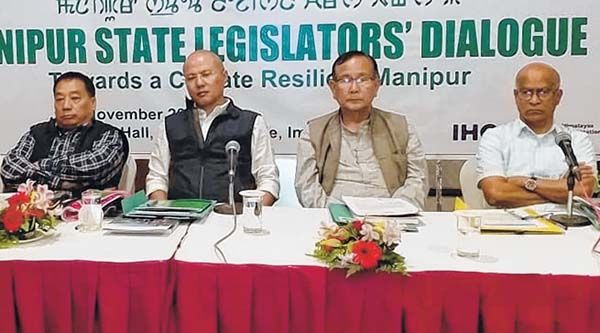Impact of climate change deliberated
Source: The Sangai Express
Imphal, November 14 2019:
Stressing on the need for leaders and representatives of the people to be well aware of the past and present environmental conditions, Lok Sabha MP Dr RK Ranjan has conveyed that with the change in climatic conditions, many staple/indigenous foods of the State have gradually started to vanish along with their native names from the vocabulary of the people as well.
Dr RK Ranjan made his statement during a programme called 'Manipur State Legislators' Dialogue - Towards a climate resilient Manipur', which was organised at Classic Grande today under the aegis of Manipur Forum For Sustainable Mountain Development, Integrated Mountain Initiative, Indian Himalayas Climate Adaptation Programme, Swiss Agency for Development and Cooperation and Department of Science and Technology.
|
Explaining the seriousness of the issue, the MP informed that with the change in climate, many indigenous food from the past are starting to disappear which in turn has led to disappearance of the names or words associated with the said food.
He said that even though the North East region normally gets plenty amount of rain, the region also often faces scarcity of drinking water.
With the coming of the Loktak project, more than 180 fish species of Manipur have disappeared, he added.
Nowadays, the impact of jhum cultivation is less pronounced in the State.
Instead, it is the illegal logging in the forests which is leading to adverse impact on the environment.
It is high time to prioritize steps and measures to protect the forests and the hills, the MP explained.
On the other hand, Outer MP Dr Lorho Pfoze observed that the present political situation prevailing in the State is temporary but climate change and its impact will be permanent and will only get worse with time.
Integrated Mountain Initiative secretary Fantry Mein Jaswal informed that by the end of the century, the temperature of the earth will rise by around 1.5 degree celsius and the Hindu Kush in the Himalaya will rise in temperature by 2.1 degree celsius.
He continued that around 4 million springs/water bodies along the Himalayan region (including from Manipur) have started to vanish and the water recharging capability of around 50 percent or half of the water bodies, has decreased.
The secretary also explained the importance of the Himalayan region which were made aware to the 15th Finance Commission as well.
Indian Institute of Science, Bengaluru, Professor NH Rabindranath said that during a short period of time, Manipur has started experiencing freak and inconsistent climate conditions like extremely high and low amount of rainfall.
Such a situation is very dangerous and this only reaffirms the need for an efficient Climate Change Adaptation Policy for Manipur, he added.
Directorate of Environment and Climate Change Deputy Director Dr T Brajakumar said that Manipur has started experiencing extreme climate change, like getting around 52 mm of rainfall in just one hour or rainfall supposed to occur during monsoon season coming much earlier or much later.
He also informed that as a part of the State Climate Change Action Plan Version 2, more focus will be given to water resources, agriculture allied and livelihood, forest resources and biodiversity, health, energy efficiency and renewable energy and strategic knowledge and climate research etc.
Indian Himalaya Climate Adaptation Programme Science Policy Officer Divya Mohan spoke on 'Towards a climate resilient Manipur' during the event which was also attended by PHE Minister L Dikho, Ukhrul MLA Alfred Kanngam S Arthur, Hill Areas Committee Chairman TT Haokip as well as ADC members.








